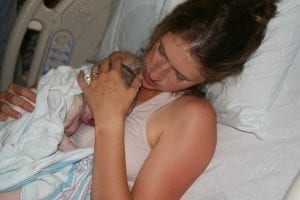 As I wrote last month, breastfeeding is the most natural thing in the world – it just doesn’t always come naturally! And last time I checked, I didn’t see any instructions attached…
As I wrote last month, breastfeeding is the most natural thing in the world – it just doesn’t always come naturally! And last time I checked, I didn’t see any instructions attached…
In the 21st century, the reality is that not everyone breastfeeds. This means that a new mom may not have grown up seeing babies fed by breast and she may not have a nursing network to tap into (word plays inevitable here!!). In most situations, the three key ingredients for successful breastfeeding are accurate education, early support, and ongoing community. Let’s tackle the first of these today.
Pregnancy puts our breasts in a whole new light (and a new cup size). Yet, there is absolutely nothing a pregnant mother needs to DO to get the girls ready for action. Pregnancy takes your breasts through all the steps needed so they are ready to produce milk and nourish your baby whenever he makes his arrival, even if the baby comes prematurely.
But you do need to educate yourself on this new topic so you know some key steps to take in the early days/weeks. So what can you do?
You can read. My recommendations: The La Leche League’s The Womanly Art of Breastfeeding, now in it’s eighth edition, and the American Academy of Pediatrics New Mother’s Guide to Breastfeeding.
You should definitely talk! Find out who in your network nurses/has nursed. You need to find women with whom you are already comfortable and ask them about their experiences. As with anything baby related, listen with an open mind, knowing that other women’s experiences will not necessarily be your own. There is certainly something to be learned from each contact!
You should expand your network. Visit a La Leche League meeting at least once while you are pregnant. This is a great time to come as you will leave with a much more realistic and accurate understanding of nursing after sitting amongst nursing moms and babies and hearing their questions and experiences. The La Leche League of New Orleans meets uptown at ZukaBaby on the first Tuesday of the month at 7:00. Our next meeting is October 2nd.
You should go back to class. Most childbirth classes will give some airtime to nursing. Touro, Oschner, West Jeff, and East Jeff all have breastfeeding specific courses.
There is a lot to learn and books, conversations, meetings, and classes are the best place to get a comprehensive survey. To those sources, I add my best practice suggestions:
- Put baby on your chest (skin to skin) immediately after birth if possible. Your body temperature helps regulate his. Your heartbeat is soothing and this action helps calm and prepare you both for your first nursing.
- Nurse the baby on both sides within the first hour. Your breasts produce colostrum initially, the magic nourishment for a newborn, coating and protecting baby’s intestines. This is a substance packed with antibodies and proteins, but low in fat, so expect your newborn to lose some ounces in the first few days before your milk comes in.
- It is critical that your baby latches on to your breast well. This will ensure that your baby can efficiently remove milk from you and that your breasts don’t become overly sore (remember if you’ve never used them to nurse before, they will be tender at first, but will toughen up soon.) Make sure you have a lactation nurse visit you DURING a nursing session so you can get feedback. (If it feels weird to think of someone giving you hands on support with your breasts, remember your modesty will be greatly reduced after childbirth.)
- Nurse on demand while in the hospital and at least for the first two weeks. Nursing is supply and demand and the more you nurse the more milk you produce. The initial two weeks is when you are establishing your long term supply so it’s especially important to ignore the clock and feed the baby whenever he is interested/gives hunger cues.
- If you have a sleepy newborn, do keep an eye on the clock in the sense that you want to feed your baby 8-12 times in a 24 hour period. Undress or change a sleepy baby’s diaper before a feeding to help wake him up.
- Follow your baby’s cues when it comes to each feeding. Offer one breast until he is satisfied (when he comes off peacefully on his own or falls asleep). Offer the second side; if he’s still hungry, he’ll eat there also. Either way, at the next feeding, start on this other side. This helps you get both sides producing and ensures that a baby is getting both the initial foremilk (watery in consistency and best for satisfying baby’s thirst) and the hindmilk that your breasts produce at the end of a feeding (creamy in consistency and best for packing on calories.)
- Don’t underestimate the natural connection that your breasts and your baby have. It is a supply and demand set-up. Your baby is unique and is the best one to determine how much he needs and when, not the clock or anyone else’s opinion. Some babies nurse efficiently and quickly, getting all they need in a few minutes. Others take longer. It’s all normal.
- We are hardwired to want to know if we are doing things right. You will never know how many ounces your baby is drinking when you nurse and that’s okay. (Civilizations thrived on breastfeeding before the concept of ounces was even introduced.) Signs that things are going well are a baby that seems satisfied at the end of a feeding, one that is pooping and peeing at expected levels (remember ranges are normal), and that is gaining weight. (Check out these growth charts for breastfed babies).
NOLA, my goal is to get an open conversation started about breastfeeding. If you are not nursing now and don’t expect any more babies in your future, make sure to share this post with someone who is pregnant or might someday be! The more educated women become about breastfeeding, the more likely they are to have a successful and enjoyable experience nursing. The more women who nurse, the wider the network of nursing mothers becomes, moving us to a place where there is a rich and deep mother-to-mother community to tap into for help.
Do you have specific books, classes, groups, or people you would recommend as resources for breastfeeding education? Please share!
Be on the lookout for more on this topic!





















St. Tammany Hospital’s classes & lactation consultants were awesome!
Are older children aloud at your lll meetings? I have a 4 month old that I’d like to attend your meeting with. I breast fed my 2 boys and I don’t remember them ever doing what my girl is doing. I feel like I can’t ever get her to eat good. She gets distracted and just forgets about eating within a couple minutes. It’s just so frustrating sometimes.
Ashley – children are welcome at meetings. Zukababy has some toys that kids can play with, but of course bringing activities might also help keep them occupied!
The Complete Book of Breastfeeding was a lifesaver for me – was so glad I read it in advance! And, I referred to it a lot duirng those first few weeks, too. It may be helpful to share any apps / ways to chart feeding, as I know in the early weeks it’s hard to get a sense of your baby’s patterns (i.e. how often they are eating is hard to remember on little sleep!)
https://www.amazon.com/The-Complete-Book-Breastfeeding-4th/dp/0761151133/ref=sr_1_1?ie=UTF8&qid=1347385622&sr=8-1&keywords=the+complete+guide+to+breastfeeding
I used the What to Expect baby tracker to keep track of nursing times for the first three months that I nursed my son. By the time I went back to work and started to pump, I felt like a pro and didn’t need it as much. 🙂 The tracker helped me see my son’s eating patterns more clearly than if I didn’t track it. It also has a dirty diaper tracker, so you can easily make sure the baby is within the normal ranges.
I cannot emphasize enough the help that the lactation nurses can provide. Don’t hesitate to call them! Even after you go home. The nurses at EJGH were so great. I took a Breastfeeding class at EJ too and it was very helpful.
I did not buy one bottle before my son was due as a way to help motivate me to make Breastfeeding work. It can be so tempting those first few weeks to supplement especially if you have bottles and formula lying around. Don’t tempt yourself! In extreme circumstances you could always send your hubby to Walgreens in the middle of the night!
Also I use an app called log4baby. It tracks Breastfeeding times, diaper changes and sleep. My son is almost 6 months now, but I still use it to help me track which breast to nurse from.
I loved A Nursing Mother’s Companion. It saved me with breastfeeding (along with LLL forums). I also love the list of medications in the back and how/if they affect breast milk. Great post Courtney! I wish more NOLA mommas would work through the tough weeks to provide for their babies the best nourishment out there.